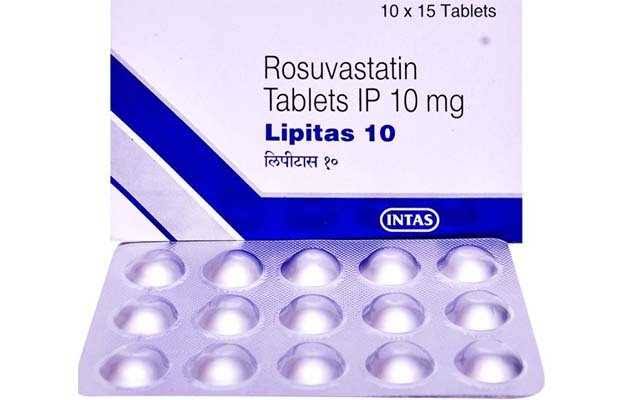Rosuvastatin – Let’s know it
Very Quick Review:
- Uses: Rosuvastatin is prescribed to treat high cholesterol and reduce the risk of cardiovascular events.
- Mechanism of Action: It works by inhibiting HMG-CoA reductase, lowering cholesterol production in the liver and increasing LDL receptor expression.
- Dosage and Preparations: Available in tablet form with various strengths (5 mg, 10 mg, 20 mg, and 40 mg), the appropriate dose is tailored to individual patient needs.
- Combination Therapy: Rosuvastatin can be combined with other medications like Ezetimibe or Fenofibrate to achieve optimal lipid control and reduce cardiovascular risk.
- Side Effects: Common side effects include muscle-related symptoms, hepatotoxicity, gastrointestinal disturbances, headache, and dizziness.
- Contraindications: It should be avoided in pregnant or breastfeeding women, severe liver disease patients, and those with a known hypersensitivity to the drug.
Overview :
Rosuvastatin, a member of the statin class of medications, stands as a potent lipid-lowering agent widely prescribed for the management of dyslipidemia and prevention of cardiovascular disease. This article provides an in-depth exploration of Rosuvastatin, encompassing its uses, mechanism of action, doses and preparations, combination therapy, side effects, and contraindications.
What are the Uses Of Rosuvastatin?
- Treatment of Hypercholesterolemia: Rosuvastatin serves as a cornerstone therapy for reducing elevated levels of low-density lipoprotein cholesterol (LDL-C) in patients with primary hypercholesterolemia or mixed dyslipidemia. The recommended starting dose typically ranges from 5 to 10 mg once daily, with dosage adjustments guided by lipid profile response.
- Prevention of Cardiovascular Events: Beyond its lipid-lowering effects, Rosuvastatin demonstrates efficacy in reducing the risk of cardiovascular events, including myocardial infarction, stroke, and revascularization procedures, in individuals with established atherosclerotic cardiovascular disease (ASCVD) or high cardiovascular risk. The recommended dose for this indication ranges from 20 to 40 mg once daily.
Mechanism of Action :
Rosuvastatin exerts its pharmacological effects by inhibiting 3-hydroxy-3-methylglutaryl-coenzyme A (HMG-CoA) reductase, the rate-limiting enzyme in the hepatic biosynthesis of cholesterol. By suppressing cholesterol production within the liver, Rosuvastatin leads to upregulation of hepatic LDL receptors, resulting in increased clearance of LDL-C from the bloodstream and subsequent reductions in serum LDL-C levels.
Doses and Preparations
Rosuvastatin is available in oral tablet formulations with various strengths, including 5 mg, 10 mg, 20 mg, and 40 mg. These dosage forms enable healthcare providers to tailor treatment regimens to individual patient needs and lipid-lowering goals. The selection of an appropriate dose depends on factors such as baseline lipid levels, cardiovascular risk profile, and tolerability.
Combination Therapy
Rosuvastatin may be utilized in combination with other lipid-lowering agents or cardiovascular medications to achieve comprehensive management of dyslipidemia and cardiovascular risk. Common combination therapies include:
- Rosuvastatin + Ezetimibe: This combination offers complementary mechanisms of action, with Rosuvastatin inhibiting cholesterol synthesis and Ezetimibe blocking intestinal absorption of cholesterol. Together, they provide synergistic reductions in LDL-C levels.
- Rosuvastatin + Fenofibrate: Combining Rosuvastatin with Fenofibrate, a fibric acid derivative, can effectively target multiple lipid abnormalities, including elevated LDL-C, triglycerides, and low high-density lipoprotein cholesterol (HDL-C) levels.
- Rosuvastatin + Aspirin: In individuals at high cardiovascular risk, the addition of aspirin to Rosuvastatin therapy may confer added cardiovascular protection by reducing the risk of thrombotic events.
What are the Side Effects Of Rosuvastatin?
- Muscle-related Side Effects: Rosuvastatin, like other statins, may cause myopathy or rhabdomyolysis, characterized by muscle pain, weakness, or tenderness. Rarely, severe muscle toxicity can occur, leading to life-threatening complications such as renal failure.
- Hepatotoxicity: Elevated liver enzymes, indicative of hepatocellular injury, may occur with Rosuvastatin therapy. Monitoring of liver function tests is recommended, particularly during the initial months of treatment.
- Gastrointestinal Disturbances: Some individuals may experience gastrointestinal side effects such as nausea, abdominal pain, diarrhea, or constipation while taking Rosuvastatin.
- Headache and Dizziness: Central nervous system-related side effects, including headache and dizziness, have been reported with Rosuvastatin use, although they are generally mild and transient.
What are the Contraindications to Rosuvastatin?
- Pregnancy and Lactation: Rosuvastatin is contraindicated in pregnant or breastfeeding women due to the potential risk of fetal harm or transmission through breast milk.
- Severe Liver Disease: Individuals with active liver disease or unexplained elevations in liver enzymes should avoid Rosuvastatin therapy, as it may exacerbate hepatocellular injury.
- Hypersensitivity: Patients with a known hypersensitivity to Rosuvastatin or any component of the medication should refrain from its use to prevent allergic reactions.
In conclusion, Rosuvastatin stands as a valuable therapeutic option for the management of dyslipidemia and prevention of cardiovascular disease. By understanding its uses, mechanism of action, dosage considerations, combination therapy options, side effects, and contraindications, healthcare providers can optimize treatment regimens and promote favorable clinical outcomes for patients at risk of cardiovascular morbidity and mortality.
What is the drug rosuvastatin used for?
Rosuvastatin is primarily used to treat high cholesterol levels and to reduce the risk of cardiovascular events such as heart attack and stroke. It is commonly prescribed to manage conditions like hypercholesterolemia and mixed dyslipidemia.
The advocacy organization’s health research group documented cases of patients who developed rhabdomyolysis after taking the drug. Rhabdomyolysis is a severe form of muscle damage that can lead to permanent kidney damage, coma and sometimes death.
Yes, rosuvastatin is considered a potent statin medication. It is classified as a high-intensity statin due to its ability to significantly lower LDL cholesterol levels. Compared to other statins, rosuvastatin has been shown to produce greater reductions in LDL cholesterol at lower doses, making it an effective option for patients with hypercholesterolemia or those at high risk of cardiovascular disease. However, its potency also means that careful monitoring for potential side effects, such as muscle-related symptoms and liver function abnormalities, is necessary when prescribing rosuvastatin.
Rosuvastatin is typically prescribed for individuals who have elevated levels of cholesterol, particularly LDL cholesterol (commonly known as “bad” cholesterol), and are at risk of cardiovascular disease. Specifically, those who may benefit from rosuvastatin include:
Individuals with high LDL cholesterol levels: Rosuvastatin is often recommended for people with elevated LDL cholesterol levels, especially if lifestyle modifications alone are insufficient to lower cholesterol to target levels.
Patients with established cardiovascular disease: People who have a history of heart attack, stroke, peripheral artery disease, or other manifestations of cardiovascular disease may benefit from rosuvastatin therapy to reduce the risk of recurrent events.
Individuals with diabetes: Diabetes is considered a major risk factor for cardiovascular disease, and rosuvastatin may be prescribed to diabetic patients to help manage their cholesterol levels and reduce cardiovascular risk.
Those with a high risk of cardiovascular events: Even in the absence of established cardiovascular disease, individuals with multiple risk factors such as hypertension, smoking, obesity, or a family history of premature heart disease may be candidates for rosuvastatin therapy to lower their risk of future cardiovascular events.
Rosuvastatin, like other statin medications, has been associated with rare cases of kidney-related side effects, particularly in individuals with pre-existing kidney disease or other risk factors. Some studies have suggested that statin use may lead to an increase in serum creatinine levels, which can indicate kidney dysfunction. However, the clinical significance of this effect is unclear, and the overall evidence regarding the impact of statins on kidney function is mixed.
For most people, especially those with normal kidney function, rosuvastatin is generally considered safe and does not pose a significant risk to the kidneys. In fact, for individuals with both high cholesterol and chronic kidney disease, rosuvastatin may be beneficial in reducing the risk of cardiovascular events, which are a major cause of morbidity and mortality in this population.
As with any medication, it is important for individuals with kidney disease to discuss the potential risks and benefits of rosuvastatin therapy with their healthcare provider. Close monitoring of kidney function through periodic blood tests may also be recommended for patients receiving rosuvastatin, especially those with underlying kidney disease or other risk factors.
Yes, it is generally safe to take rosuvastatin daily as prescribed by a healthcare provider. Rosuvastatin is a widely used and well-tolerated medication for lowering cholesterol levels and reducing the risk of cardiovascular events. However, like all medications, rosuvastatin may have potential side effects and risks, which should be carefully considered by healthcare providers when prescribing it to patients.
For most individuals, the benefits of rosuvastatin therapy in terms of reducing cholesterol levels and lowering cardiovascular risk outweigh the potential risks. It is essential to take rosuvastatin exactly as directed by a healthcare provider and to attend regular follow-up appointments to monitor for any adverse effects or changes in cholesterol levels.
Patients should also be aware of potential side effects of rosuvastatin, such as muscle pain or weakness, liver function abnormalities, and gastrointestinal disturbances. Any concerning symptoms should be promptly reported to a healthcare provider for further evaluation.
Overall, when used appropriately and under medical supervision, rosuvastatin is considered a safe and effective medication for managing high cholesterol and reducing the risk of cardiovascular disease.
No, rosuvastatin is not a blood thinner. Rosuvastatin belongs to a class of medications known as statins, which work by lowering cholesterol levels in the blood. Specifically, rosuvastatin inhibits the enzyme HMG-CoA reductase, which plays a key role in the production of cholesterol in the liver.
Blood thinners, also known as anticoagulants, are medications that prevent the formation of blood clots or inhibit the clotting process. They are used to treat or prevent conditions such as deep vein thrombosis (DVT), pulmonary embolism (PE), stroke, and heart attack. Examples of blood thinners include warfarin, heparin, and direct oral anticoagulants (DOACs) such as rivaroxaban and apixaban.
While rosuvastatin and blood thinners both play important roles in managing cardiovascular health, they work through different mechanisms and have distinct therapeutic effects. Rosuvastatin primarily targets cholesterol levels, whereas blood thinners specifically inhibit the clotting process in the blood.

